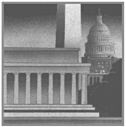NATIONAL ACADEMY PRESS
2101 Constitution Avenue, N.W. Washington, DC 20418
NOTICE: The project that is the subject of this report was approved by the Governing Board of the National Research Council, whose members are drawn from the councils of the National Academy of Sciences, the National Academy of Engineering, and the Institute of Medicine. The members of the committee responsible for the report were chosen for their special competences and with regard for appropriate balance.
Support for this project was provided by The Robert Wood Johnson Foundation. The views presented in this report are those of the Institute of Medicine and are not necessarily those of the funding agencies.
Additional copies of this report are available for sale from the
National Academy Press,
2101 Constitution Avenue, N.W., Box 285, Washington, D.C. 20055. Call (800) 624–6242 or (202) 334– 3313 (in the Washington metropolitan area), or visit the NAP’s home page at www.nap.edu. The full text of this report is available at www.nap.edu.
For more information about the Institute of Medicine, visit the IOM home page at: www.iom.edu.
Copyright 2001 by the National Academy of Sciences. All rights reserved.
Printed in the United States of America.
The serpent has been a symbol of long life, healing, and knowledge among almost all cultures and religions since the beginning of recorded history. The serpent adopted as a logotype by the Institute of Medicine is a relief carving from ancient Greece, now held by the Staatliche Museen in Berlin.
THE NATIONAL ACADEMIES
National Academy of Sciences
National Academy of Engineering
Institute of Medicine
National Research Council
The National Academy of Sciences is a private, nonprofit, self-perpetuating society of distinguished scholars engaged in scientific and engineering research, dedicated to the furtherance of science and technology and to their use for the general welfare. Upon the authority of the charter granted to it by the Congress in 1863, the Academy has a mandate that requires it to advise the federal government on scientific and technical matters. Dr. Bruce M.Alberts is president of the National Academy of Sciences.
The National Academy of Engineering was established in 1964, under the charter of the National Academy of Sciences, as a parallel organization of outstanding engineers. It is autonomous in its administration and in the selection of its members, sharing with the National Academy of Sciences the responsibility for advising the federal government. The National Academy of Engineering also sponsors engineering programs aimed at meeting national needs, encourages education and research, and recognizes the superior achievements of engineers. Dr. Wm.A.Wulf is president of the National Academy of Engineering.
The Institute of Medicine was established in 1970 by the National Academy of Sciences to secure the services of eminent members of appropriate professions in the examination of policy matters pertaining to the health of the public. The Institute acts under the responsibility given to the National Academy of Sciences by its congressional charter to be an adviser to the federal government and, upon its own initiative, to identify issues of medical care, research, and education. Dr. Kenneth I.Shine is president of the Institute of Medicine.
The National Research Council was organized by the National Academy of Sciences in 1916 to associate the broad community of science and technology with the Academy’s purposes of furthering knowledge and advising the federal government. Functioning in accordance with general policies determined by the Academy, the Council has become the principal operating agency of both the National Academy of Sciences and the National Academy of Engineering in providing services to the government, the public, and the scientific and engineering communities. The Council is administered jointly by both Academies and the Institute of Medicine. Dr. Bruce M.Alberts and Dr. Wm.A.Wulf are chairman and vice chairman, respectively, of the National Research Council.
REVIEWERS
This report has been reviewed in draft form by individuals chosen for their diverse perspectives and technical expertise, in accordance with procedures approved by the NRC’s Report Review Committee. The purpose of this independent review is to provide candid and critical comments that will assist the institution in making its published report as sound as possible and to ensure that the report meets institutional standards for objectivity, evidence, and responsiveness to the study charge. The review comments and draft manuscript remain confidential to protect the integrity of the deliberative process. We wish to thank the following individuals for their review of this report:
Karen Edison, Senate Committee on Health, Education, Labor, and Pensions
Peter Hasselbacher, University of Louisville
Howard K.Rabinowitz, Thomas Jefferson University
David N.Sundwall, American Clinical Laboratory Association
Although the reviewers listed above have provided many constructive comments and suggestions, they were not asked to endorse the conclusions or recommendations nor did they see the final draft of the report before its release. The review of this report was overseen by Mel Worth, Institute of Medicine. He was responsible for making certain that an independent examination of this report was carried out in accordance with institutional procedures and that all review comments were carefully considered. Responsibility for the final content of this report rests entirely with the authoring committee and the institution.
FOREWORD

THE ROBERT WOOD JOHNSON HEALTH POLICY FELLOWSHIPS PROGRAM
Since 1973, Robert Wood Johnson Health Policy Fellows have come to Washington to learn first-hand how health care policy and legislation are formulated in our nation’s capital. Individuals selected to this prestigious fellowships program are themselves distinguished mid-career health professionals who come from a variety of backgrounds, including academic health centers, community-based health care systems, managed care organizations, and local health departments. For most of the year, Fellows work for congressional or executive branch offices with major jurisdiction for the funding and oversight of federal health programs and initiatives.
During the life of the fellowships—almost 30 years—virtually all of the major health care issues relating to access, cost, and quality have received headline attention at one point or another. Fellows, however, are always amazed and delighted that the ongoing health care reform agenda continually brings with it new lessons, insights, and challenges.
As part of the fellowships year, Fellows get together with senior Institute of Medicine staff on a monthly basis and present a case study on a health care issue in which they have become closely involved as part of their working assignment. While the issues, stakeholders, policies, and politics may vary with the topic and the times, two dynamics appear to be critical and underlying features of the legislative process. The first focuses on the role of information and how it is produced, presented, and packaged to influence the health policy process. The second relates to the “unintended consequences” that accompany many health programs and legislation.
In 1997, our office published Information Trading: How Information Influences the Health Policy Process. The book, a compilation of seven case studies, illustrates how information is used and conveyed and to what degree it influenced the outcome. The volume met with considerable success and came to be used in many classes of public and health policy.
As a follow-up to Information Trading, another group of Fellows took a closer look at some of the well-known examples of unintended consequences of health care legislation and policies. Some of the case studies commissioned for this investigation became the focus of a workshop discussion, the summary of which forms the basis of this document. The workshop was ably moderated by Lynn Etheredge, a nationally known health policy expert, and written up by Wendy Young, a nurse scholar and former Fellow, who played a major role in the Information Trading project. The purpose of the workshop was not to come to any definitive conclusions about how and why unintended consequences occur, but rather to gain a better understanding of why this phenomenon is a frequent and consequential byproduct of major health programs.
The Robert Wood Johnson Health Policy Fellowships Program of the Institute of Medicine conducted a workshop on the subject of unintended consequences of health policy programs and policies.
The workshop discussion highlighted some recurring themes pertaining to unintended consequences. Stakeholders, for example, frequently warn of unintended consequences during the legislative process, but often some time has to pass before their full scope and impact are revealed. Moreover, over time new programs come to operate in different health policy environments that include dynamics not present when the legislation was first passed.
Political realities often deter policy modifications and refinements to correct unintended consequences. Stakeholders may recognize that a program or law is no longer well-targeted, but any attempt to modify can bring with it a new and uncertain policy and political process. Another theme frequently heard in the workshop discussion focused on the need for politicians to act promptly in response to a problem, even when the information- and science-base is deficient.
Students of health policy and health politics will find timely information and interesting insights in this monograph. While unintended consequences will continue to be part of the legislative process, a better understanding of this phenomenon is both useful and valuable.
Marion Ein Lewin
Director
Office of Health Policy Programs and Fellowships
Institute of Medicine
August 2001









